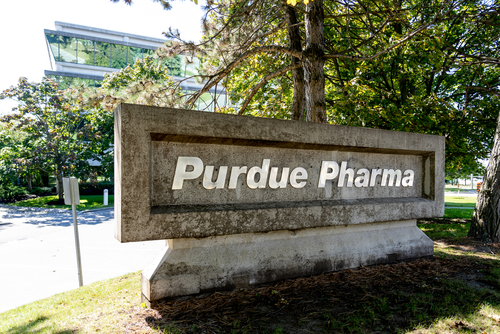
Opioid manufacturer Purdue Pharma has pleaded guilty in federal court to conspiracies to defraud the United States and violate the anti-kickback statute.
In a press release from the U.S. Department of Justice, the U.S. Attorney General’s office said the pharmaceutical company pleaded guilty in court in Newark, N.J., to one count of dual-object conspiracy to defraud the United States and to violate the Food, Drug, and Cosmetic Act, and two counts of conspiracy to violate the Federal Anti-Kickback Statute.
“The abuse and diversion of prescription opioids has contributed to a national tragedy of addiction and deaths, in addition to those caused by illicit street opioids,” said Deputy Attorney General Jeffrey A. Rosen. “Today’s guilty pleas to three felony charges send a strong message to the pharmaceutical industry that illegal behavior will have serious consequences. Further, today’s convictions underscore the department’s commitment to its multi-pronged strategy for defeating the opioid crisis.”
The plea is part of an $8 billion settlement reached by the DOJ with the company in October 2020. That settlement includes a criminal fine of $3.544 billion and an additional $2 billion in criminal forfeiture – $225 million of which will be paid within three days of conviction; the rest to be paid through an unsecured bankruptcy claim.
As part of the guilty plea, the company admitted that from May 2007 through at least March of 2017, it had conspired to defraud the United States by impeding the lawful function of the Drug Enforcement Administration. In specific, the company admitted that it represented to the DEA that it had an effective anti-diversion program, when, in fact, it continued to market its opioids to health care providers the company had reason to believe were diverting the products. The company also admitted that it provided the DEA with misleading information to boost its opioid manufacturing quotas.
Lastly, the company admitted to conspiracy to violate the Food, Drug, and Cosmetic Act by facilitating the dispensing of its opioid products, like OxyContin, without a legitimate medical purpose or lawful prescription.
The company also admitted that between June 2009 and March to making payments to two doctors through the company’s speaker program to write more prescriptions for the company’s opioid products, and that from April 2016 through December 2016, the company made payments to an electronic health records company in exchange for referring, recommending and arranging for the ordering of Purdue’s extended-release opioid products – OxyContin, Butrans and Hysingla.
“Purdue admitted that it marketed and sold its dangerous opioid products to healthcare providers, even though it had reason to believe those providers were diverting them to abusers,” said Rachael A. Honig, First Assistant U.S. Attorney for the District of New Jersey. “The company lied to the Drug Enforcement Administration about steps it had taken to prevent such diversion, fraudulently increasing the amount of its products it was permitted to sell. Purdue also paid kickbacks to providers to encourage them to prescribe even more of its products.”
The DOJ said that this settlement agreement does not resolve any of the thousands of claims that states and local governments may have against the company or members of the Sackler family that owns the company.




